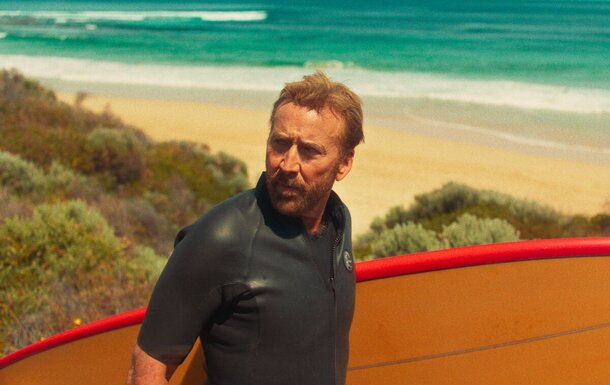There’s something hypnotic about watching Nicolas Cage unravel — and The Surfer delivers that experience like a riptide. I went in expecting a slow-burn psychological drama, but what I got felt more like a spiritual acid trip soaked in sunburn and paranoia. This is not your usual beachside redemption tale — it’s a descent into the psyche, told through salt, sweat, and Cage’s increasingly erratic hair.
A spoiler-free glimpse into the madness
Set in a coastal town in Western Australia, the story follows a man (Cage) returning to a beach where he once surfed as a boy. What begins as a nostalgic homecoming turns quickly into a psychological war with the local surf gang who “own” the waves now. But don’t expect Point Break — this is closer to The Lighthouse meets Falling Down, with Cage’s character spiralling into delusion, obsession, and existential dread. It’s less about catching waves, and more about catching ghosts of a man’s shattered self.
Visionary direction in a sun-scorched landscape
Director Lorcan Finnegan (Vivarium) crafts a hallucinatory world that turns paradise into purgatory. With his trademark psychological edge, Finnegan leans heavily into metaphor — the ocean is no longer freedom, but torment. Time feels loose. Reality blurs. And there's a surreal sense that the beach itself is conspiring against Cage. It’s disorienting, yes, but also impossible to look away.

Cage unleashed — and utterly magnetic
Nicolas Cage is in peak "Cage-mode" here — veering from vulnerability to volcanic rage in the space of a single breath. It’s a performance that treads the fine line between brilliant and bonkers, but somehow always feels intentional. You’re never quite sure if his character is losing it… or finding something the rest of us are too afraid to face.
There’s very little traditional “supporting cast,” which only heightens the film’s focus on Cage’s solitary descent. The antagonistic surfers are more symbolic than fully fleshed-out characters — faceless representations of power, youth, and masculine posturing.
Sunlit horror and underwater soundscapes
Visually, this film is stunning. Cinematographer Stefan Duscio bathes everything in an eerie, golden glare — the kind that makes sweat shimmer and sand feel like it’s burning through your retinas. The ocean scenes are gorgeous yet unsettling, and the way the camera lingers on Cage’s isolation creates an almost claustrophobic atmosphere, despite the open skies.
Sound-wise, the crashing waves become a psychological weapon, and the ambient score slips beneath your skin like a current you didn’t realise was pulling you under.

Themes: identity, ego, and survival of the soul
What makes The Surfer linger is its exploration of fragile masculinity, ageing, and the painful process of confronting one’s irrelevance. The beach isn’t just a place — it’s a battleground for identity. Cage’s character isn’t just fighting surfers; he’s fighting memory, regret, and the looming void of a life wasted.
Audience Reactions: USA vs. UK
In the USA, reactions were mixed. Some praised Cage’s commitment and the film’s haunting visuals, while others found the surrealism a bit too opaque — especially those expecting an action flick.
In the UK, however, it’s been met with more intrigue and appreciation from indie film lovers and critics alike. British viewers seem more attuned to the psychological, slow-burn elements and the social satire beneath the sand and sweat. Several UK outlets have even hinted at cult classic potential.
Final Verdict
This isn’t a film you “enjoy” in the traditional sense. It’s an experience — raw, sun-drenched, and utterly Cage. If you’re ready to surrender to its strange rhythm and unravel along with its protagonist, The Surfer is a wild ride worth catching.
IMDb Rating: 6.5/10
My Recommendation: Watch it for Cage. Stay for the sunlit descent into madness.











